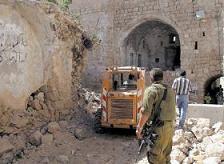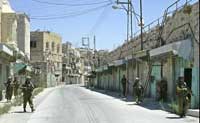
Three historic buildings in the Old City of Hebron had to make way for a walkway on Monday. The demolition of the three buildings, which date back to the Mamluk period and comprise eleven housing units, was ordered by the Israeli military, which also confiscated a 700-meter plot belonging to the Islamic Awkaf (trust) just east of the Ibrahimi Mosque.
The planned walkway will be exclusively for settler use, and is meant to provide the settlers with a more direct and convenient connection from the settlement of Kiryat Arba’ (located on the outskirts of Hebron’s Old City) to the Ibrahimi Mosque. Large parts of the Old City have also been seized by the Israeli military over the years and turned into 'colonies' accessible exclusively to settlers. Entire market areas in the commercial district have been sealed off by the military as well, all under the usual security pretext, thus effectively destroying the livelihoods of most of the shop-owners in the area.
The Ibrahimi mosque, which is also called the Tomb of Patriarchs, has for decades been the focus of the settler movement. Their quest to take over the mosque and 'Judaize' it, along with the city, is propelled by a radical and hostile ideology that endorses, for example, the massacre of 29 Palestinian worshippers in the Ibrahimi Mosque, which was carried out by the now notorious Baruch Goldstein, a celebrated icon among the Israeli settler community.
The demolition of structures by the Israeli military and the dispossession of people’s homes are all too common for Palestinians, especially in Hebron. The settlers’ forceful and disruptive penetration of the city has been compounded for years by severe military restrictions applied to its Palestinian residents and buildings, including for example prolonged curfews, severely limited access to residential areas, and the prohibition of maintenance or rehabilitation of structures (to name just a few). All these measures are designed to effectively cause the 'voluntary' desertion of the local community, thereby facilitating further settler takeover of the city.
This latest demolition in Hebron epitomizes in many ways the predicament of the entire occupied Palestinian territories. It reflects the ease with which Palestinian individual property or communal heritage is demolished to serve Israeli expansionist aims, and the 'judaisation’ of the West Bank, or "Judea and Samaria" as it is widely referred to in Israel. Whether parts of a millennia-old city are demolished, or villages are encroached upon and olive groves uprooted and burnt down to allow for US suburban style settlements, the 'prerogatives' of the Jewish settlers always outweigh the rights of the local communities.
Equally grave, such wanton destruction epitomizes the contempt for the Arab, and in particular the Muslim, character of the local population and the land. The seizure of various holy sites in the Palestinian territories by the Israeli state, through its endorsement of the zealous settler movement, and the 'conversion' of these sites into sites exclusively for Jews, is a major part of Israel's tireless and systematic effort to deny Palestinians their heritage wherever possible. The destruction of non-religious heritage, such as in Hebron or in Nablus, also serves the same purpose.
The case of Hebron also reveals the extent to which Israeli settlers are willing to go to materialize their objectives. Just as the settlers successfully seized a large part of the Ibrahimi mosque by force, and intend to seize the rest, the Haram al-Sharif, or Holy Sanctuary, in Jerusalem, is also in danger of similar threats. The desire to see the Haram al-Sharif destroyed and replaced with a "Third Temple” is expressed by many in Israel today, and not only within the settler movement. Reports of Jewish fanatics planning to strike the Haram al-Sharif are increasingly frequent, and according to Israeli papers, a recent plan involved an attack on the sanctuary by a small civilian aircraft. Precedents of attacks unfortunately already exist, most notable among which was the burning of parts of Al-Aqsa Mosque in 1969 by a pro-Zionist Australian tourist.
Although the recent threats to the Haram al-Sharif seem to be rather impotent, given Israel’s stated intention of preventing them from occurring, this should not be understood to mean that Israel does so out of categorical or moral objections, but rather, out of self-interested political considerations. The digging of a large tunnel under the Haram al-Sharif, compromising the structural integrity of the sanctuary, together with the flagrant assertion of Israeli "sovereignty" over the site, attest to Israel's position on Palestinian and Islamic sites.
The exclusive and antagonistic 'ideological' essence that is behind much of the prevailing Israeli attitude towards Palestinians, was perhaps best captured by Naomi Shmer, the late Israeli icon and Zionist singer, when she remarked that “a place without Jews is a deserted place. Any place without Jews is an empty place.”
The staunchest implementation of the best of plans to end this conflict, coupled with the most ardent international support and intervention, will not be able to secure a true peace as long as Israeli colonization within occupied Palestinian territory continues, regardless of what pretext it is done under, and as long as Palestinians, their identity and heritage, are the subject of Israeli contempt instead of recognition.
Any viable settlement ultimately requires good faith, and while actual circumstances on the ground remain more dramatic, Israelis, and others alike, need to exercise rigorous self-scrutiny if this conflict is not to be ended through the obliteration of one by the other.
◦ Audio-visual report on Israeli colonization and other related activity in Hebron (5.5 MB, Macromedia Flash)
prepared by the Hebron Rehabilitation Committee (5.5 MB, Macromedia Flash)








